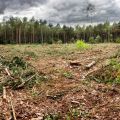UK lockdown linked to widening disadvantage gap for babies and toddlers
27 October 2020
- The impact of social distancing measures on babies and toddlers has been largely overlooked – new data suggests that we need to pay attention to families with very young children.
- During the spring 2020 lockdown – but not before lockdown – parents from disadvantaged backgrounds reported spending less time on activities with their babies and toddlers, compared with parents from more advantaged backgrounds.
- In particular, during lockdown, children from disadvantaged backgrounds spent less time on activities requiring outdoor space, or access to books.
- Lockdown was linked to a general increase in TV and touchscreen use for babies and toddlers. Children from disadvantaged backgrounds were particularly likely to have high daily screen use.
Babies and toddlers from disadvantaged backgrounds have been missing out on activities to support their development, compared to children of highly-educated, well-paid parents, new research has found. The early results are the first to come from a new study investigating family life and early child development during the COVID-19 crisis, run by a team of researchers from 5 leading UK universities, including University of Oxford, and funded by the Economic and Social Research Council (ESRC) as part of the UK Research and Innovation’s rapid response to COVID-19.
Over 500 parents from across the UK of children under three years have taken part so far in the Social Distancing and Development Study (SDDS). Parents were asked about time spent doing enriching activities with their child, and amount of screen time, before and during lockdown. Enriching activities included reading, playing, singing, one-to-one conversations, cooking, arts and crafts, exercise, gardening and shared outdoors time.
University of Oxford researcher, Alex Hendry, who led the first report to come out of the study said: “Children depend on high-quality interactions to support all aspects of their development. It is heartening to see that most families have been managing to find time to talk, read and play with their babies during this critical time, even amongst everything else going on. But from what parents are telling us it is clear that during lockdown some babies have been missing out.”
Ninety per cent of families reported an increase in enriching activities during lockdown, but increases were not spread equally across families. During lockdown – but not before lockdown – disadvantaged parents (lower income, education, occupational status and/or living in a deprived neighbourhood) were less likely to engage in enriching activities. In particular, disadvantaged families spent less time doing activities that require outdoor space and access to books.
Seventy-five per cent of parents reported that during lockdown their children spent more time than usual watching TV or playing with a tablet. Children from disadvantaged backgrounds were particularly likely to have high daily screen use.
Oxford Brookes University researcher Dr Nayeli Gonzalez-Gomez, who leads the SDSS project said: “While we know disadvantaged families often do not have access to the same opportunities for child development as their more well-off peers, these disadvantages were exacerbated by the UK lockdown. In particular, the closure of playgrounds and libraries has disproportionately impacted children from disadvantaged backgrounds.
“In the event of continued local lockdowns, it is vital that disadvantaged families are given extra support to promote children’s early development. Access to communal outdoor spaces and shared resources such as libraries should only be restricted as a last resort.”
Sally Hogg, Head of Policy and Campaigning at the Parent-Infant Foundation, added: “This research demonstrates, yet again, that babies in families from more disadvantaged communities have been impacted more by the Covid-19 crisis. The crisis has been difficult for most people, but has had a particular impact on families without the resources to buffer its impacts for their babies.
“Sadly too many of our young children live in poverty, poor housing and without stimulating toys and books at home. These results show the impact that the closure of libraries, playgrounds and drop-in groups had for these children. National and local governments must hold these results in mind when making decisions about future lockdowns and families’ access to activities and support.
“Evidence shows us that what happens in the first 1001 days, from pregnancy, lays the foundations for later development. Therefore the impact of inequitable experiences during the pandemic may have lasting effects without immediate action to support families. This is why we are calling for babies and young children to be central to the COVID-19 recovery efforts. We are calling for a one-off Baby Boost, a catch-up fund to enable local services to support families who have had a baby during or close to lockdown. There have been catch-up funds for school age children, but this research reinforces that young children need support too.”
The Social Distancing and Development Study is investigating the impact of social distancing and lockdown on infants’ cognitive development, sleep, social interactions, screen-use and time spent outdoors. The research aims to inform policy makers on how to reduce further impact on children’s development and identify the best ways to support families as the country moves through the crisis.
The study, which has been undertaken by Oxford Brookes University researcher Nayeli Gonzalez-Gomez in collaboration with Alexandra Hendry at University of Oxford, Catherine Davies at the University of Leeds, Theodora Gliga at the University of East Anglia, and Michelle McGillion at the University of Warwick and funded by UK Research and Innovation, will continue until November 2021. This research is supported through UKRI COVID-19 funding.
Notes to editors:
For further information, please contact: Genevieve Juillet, Media Relations Manager (Research and Innovation), University of Oxford, [email protected]
The full paper, Not all babies are in the same boat: Exploring how socioeconomic status, parental attitudes, and activities during UK COVID-19 Lockdown affect early Executive Functions, is currently under peer review. The paper is authored by Alexandra Hendry (University of Oxford), Shannon P. Gibson (Oxford Brookes University), Catherine Davies (University of Leeds), Teodora Gliga (University of East Anglia), Michelle McGillon (University of Warwick), Nayeli Gonzalez-Gomez (Oxford Brookes University).
The Social Distancing and Development Study is funded by the Economic and Social Research Council (ESRC) as part of the UK Research and Innovation’s rapid response to COVID-19 (ES/V004085/1). Dr Hendry is supported by the Scott Family Junior Research Fellowship in Autism, at University College Oxford · Images accompanying this report are accessible here: https://babylab.brookes.ac.uk/research/social-distancing-and-development/family-activities
The Babies in Lockdown report was developed by Best Beginnings, Home-Start UK and the Parent-Infant Foundation can be viewed at https://babiesinlockdown.info
To arrange quotes and photographs from parents with relevant experiences, and arrange contributors for live interviews please contact [email protected]
tel: 07465 223 283.
The University of Oxford
Oxford University has been placed number 1 in the Times Higher Education World University Rankings for the fifth year running, and at the heart of this success is our ground-breaking research and innovation. Oxford is world-famous for research excellence and home to some of the most talented people from across the globe. Our work helps the lives of millions, solving real-world problems through a huge network of partnerships and collaborations. The breadth and interdisciplinary nature of our research sparks imaginative and inventive insights and solutions.
The University of Oxford’s Experimental Psychology Department’s mission is to conduct world-leading experimental research to understand the psychological and neural mechanisms relevant to human behaviour. Wherever appropriate, we translate our findings into evidence-based public benefits in mental health and well-being, education, industry, and policy. Key areas of research include Behavioural Neuroscience, Developmental Psychology, Social Psychology, and Psychological and Brain Health.
 Dr Ashwin Jainarayanan selected for 2024 Schmidt Science Fellow program
Dr Ashwin Jainarayanan selected for 2024 Schmidt Science Fellow program
 New study to improve vaccines and therapeutics development
New study to improve vaccines and therapeutics development
 Nature degradation could cause a 12% loss to UK GDP
Nature degradation could cause a 12% loss to UK GDP
 Alok Sharma to join the Oxford Martin School as a Visiting Fellow
Alok Sharma to join the Oxford Martin School as a Visiting Fellow
 Landmark study definitively shows that conservation actions are effective at halting and reversing biodiversity loss
Landmark study definitively shows that conservation actions are effective at halting and reversing biodiversity loss